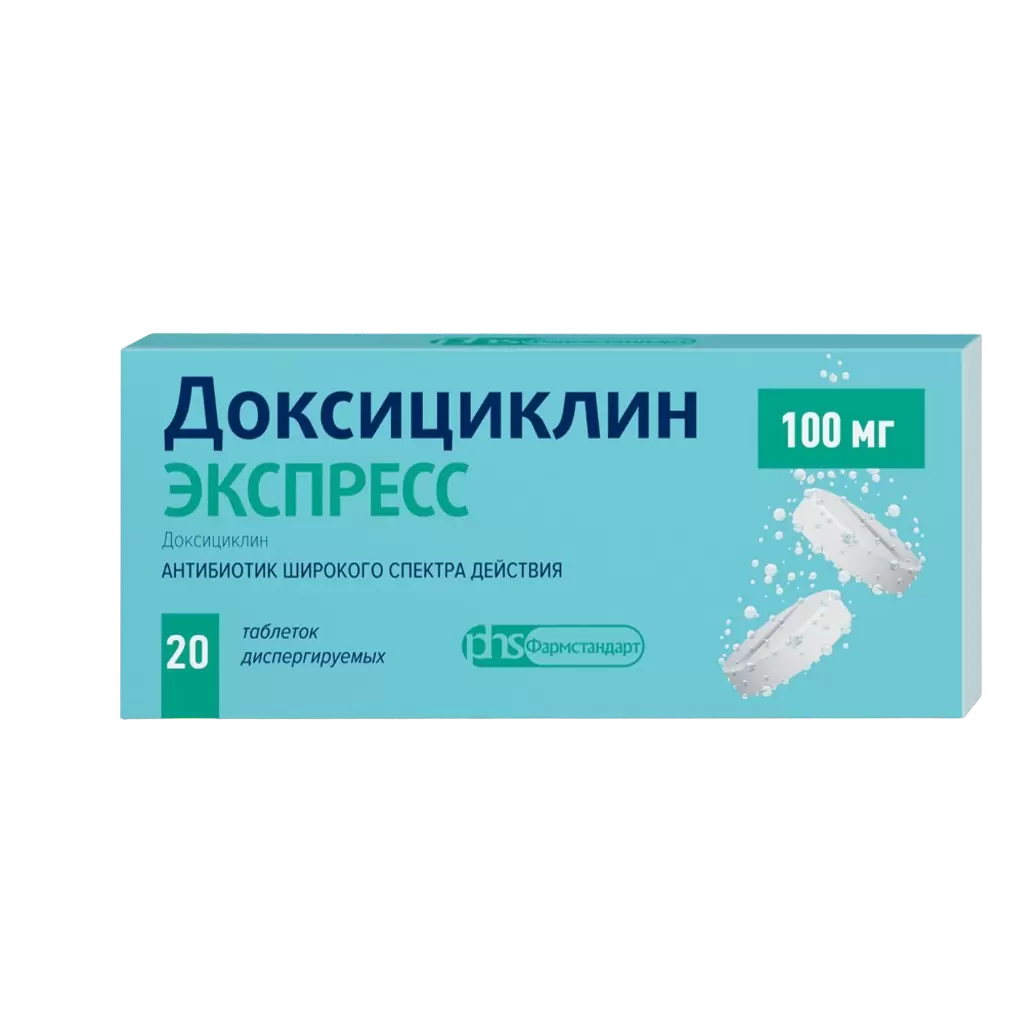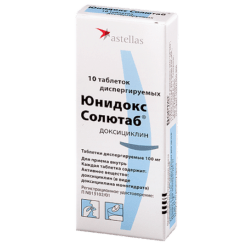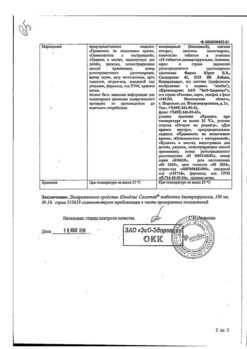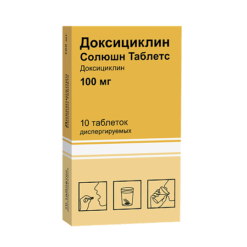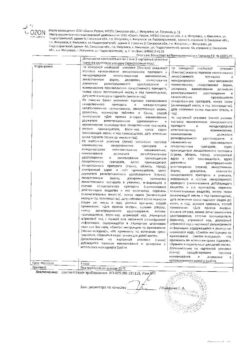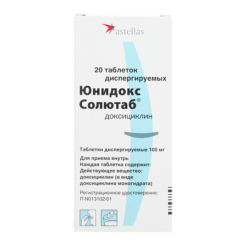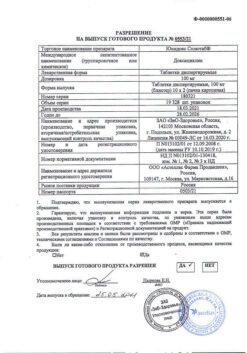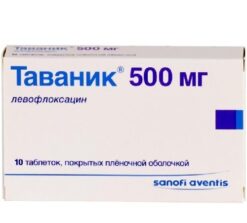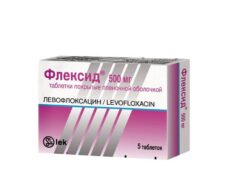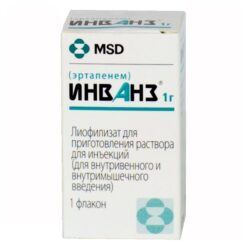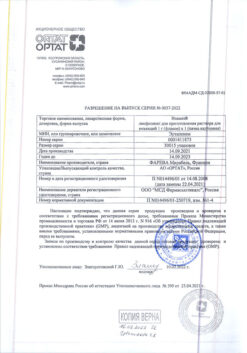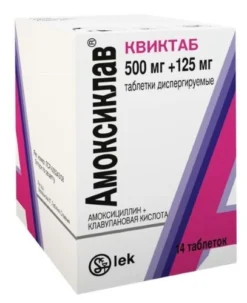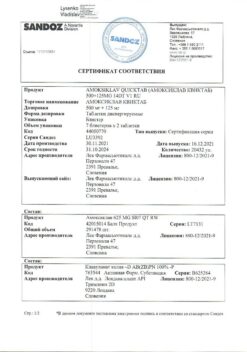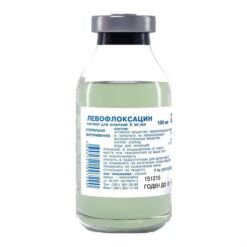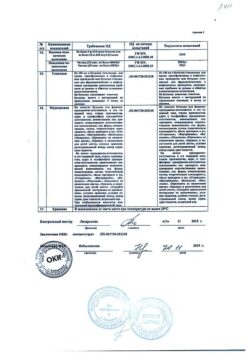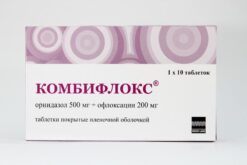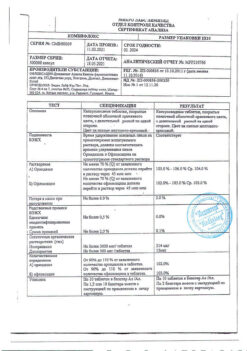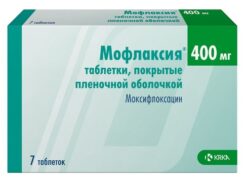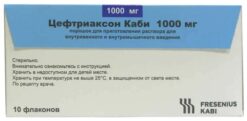No products in the cart.
Doxycycline Express, 100 mg 20 pcs.
€15.90 €13.78
Description
Antibiotic – tetracycline
ATX code:
J01AA02
Pharmacological properties
Pharmacodynamics
A broad spectrum antibiotic of the tetracycline group. It has bacteriostatic activity, inhibits protein synthesis in microbial cell by interaction with 30S ribosome subunit. It is active against many Gram-positive and Gram-negative microorganisms: Streptococcus spp., Treponema spp., Staphylococcus spp., Klebsiella spp, Enterobacter spp. (including E. aerugenes), Neisseria gonorrhoeae, Neisseria meningitidis, Haemophilus influenzae, Chlamydia spp., Mycoplasma spp., Ureaplasma urealyticum, Listeria monocytogenes, Rickettsia spp., Typhus exanthematicus, Escherichia coli, Shigella spp, Campylobacter fetus, Vibrio cholerae, Yersinia spp. (including Yersinia pestis), Brucella spp., Francisella tularensis, Bacillus anthracis, Bartonella bacilliformis, Pasteurella multocida, Borrelia recurrentis, Clostridium spp. (except Clostridium difficile), Actinomyces spp, Fusobacterium fusiforme, Calymmatobacterium granulomatosis, Propionibacterium acnes, some protozoa (Entamoeba spp., Plasmodium falciparum).
As a rule, it has no effect on Acinetobacter spp., Proteus spp., Pseudomonas spp., Serratia spp., Providencia spp., Enterococcus spp.
The possibility of acquired resistance to doxycycline in a number of pathogens should be taken into account, which is often cross-over within the group (i.e., strains resistant to doxycycline will simultaneously be resistant to the entire tetracycline group).
Pharmacokinetics
Intake
Absorption is fast and high (about 100%). Consumption of food insignificantly affects absorption of the preparation.
Maximal level of doxycycline in plasma (2.6-3 mkg/ml) is reached within 2 hours after taking 200 mg, after 24 hours plasma concentration of active substance decreases to 1.5 mkg/ml.
After taking 200 mg on the first day of treatment and 100 mg daily during the next days the level of doxycycline concentration in plasma is 1.5-3 mkg/ml.
Doxycycline is reversibly bound to plasma proteins (80-90%), penetrates well into organs and tissues, poorly – into cerebrospinal fluid (10-20% of plasma level), but doxycycline concentration in cerebrospinal fluid increases during cerebrospinal inflammation.
The volume of distribution is 1.58 l/kg. Within 30-45 minutes after oral administration doxycycline is found in therapeutic concentrations in the liver, kidneys, lungs, spleen, bones, teeth, prostate, eye tissues, pleural and ascitic fluid, bile, synovial exudate, maxillary and frontal sinuses exudate, gingival sinus fluid.
In normal hepatic function, the drug level in bile is 5-10 times higher than in plasma. In saliva, 5-27% of the value of doxycycline concentration in blood plasma is determined. Doxycycline penetrates the placental barrier and is secreted into breast milk in small amounts. It accumulates in dentin and bone tissue.
Metabolism
Metabolizes a small part of doxycycline.
Elimation
The elimination half-life after a single oral dose is 16-18 hours, after repeated doses – 22-23 hours.
About 40% of the drug taken is excreted by the kidneys and 20-40% is excreted through the intestine as inactive forms (chelates).
Pharmacokinetics in special clinical cases
The half-life of the drug in patients with impaired renal function does not change, because its excretion through the intestine increases.
Hemodialysis and peritoneal dialysis have no effect on plasma concentration of doxycycline.
Indications
Indications
Infectious and inflammatory diseases caused by microorganisms sensitive to the drug:
Active ingredient
Active ingredient
Composition
Composition
How to take, the dosage
How to take, the dosage
Interaction
Interaction
Special Instructions
Special Instructions
There is a possibility of cross-resistance and hypersensitivity with other tetracycline drugs.
Tetracyclines may increase prothrombin time, the prescription of tetracyclines in patients with coagulopathies should be carefully controlled.
The anti-anabolic effect of tetracyclines may lead to increased levels of residual urea nitrogen in the blood. This is generally not significant in patients with normal renal function. However, in patients with renal insufficiency, an increase in azotemia may be observed. The use of tetracyclines in patients with impaired renal function requires medical monitoring.
With long-term use of the drug it is necessary to periodically control laboratory blood parameters, liver and kidney function.
Perhaps due to the development of photodermatitis it is necessary to limit sun exposure during treatment and for 4-5 days afterwards.
When using the drug, both during treatment and 2-3 weeks after discontinuation, diarrhea caused by Clostridium difficile may develop. In mild cases, withdrawal of treatment and use of ion exchange resins (colestiramine, colestipol) is sufficient; in severe cases reimbursement of loss of fluid, electrolytes and protein and administration of vancomycin or metronidazole are indicated.
Drugs that inhibit intestinal peristalsis should not be used.
Prolonged use of the drug may cause intestinal dysbiosis and, consequently, the development of hypovitaminosis (B vitamins).
In order to prevent dyspeptic complaints it is recommended to take the drug with food.
To avoid development of esophagitis or esophageal ulcer it is necessary to take the drug with plenty of water and avoid using the drug just before going to bed.
It is unknown about the effect on the ability to drive vehicles, mechanisms. If dizziness, blurred vision or double vision develops, driving motor transport or operating machinery is not recommended (see side effect).
Contraindications
Contraindications
Side effects
Side effects
Overdose
Overdose
Pregnancy use
Pregnancy use
Similarities
Similarities
Additional information
| Weight | 0.016 kg |
|---|---|
| Shelf life | 2 years. Do not use after the expiration date. |
| Conditions of storage | Store in the original package at a temperature not exceeding 25 ° C. Keep out of reach of children. |
| Manufacturer | Pharmstandard-Leksredstva, Russia |
| Medication form | dispersible tablets |
| Brand | Pharmstandard-Leksredstva |
Other forms…
Related products
Buy Doxycycline Express, 100 mg 20 pcs. with delivery to USA, UK, Europe and over 120 other countries.

